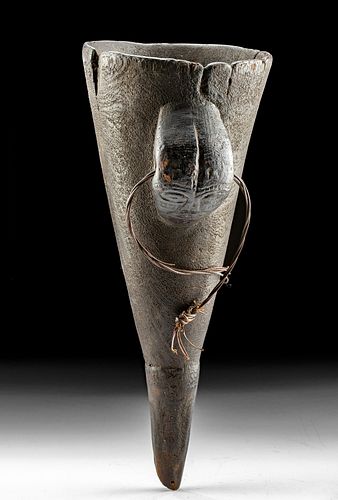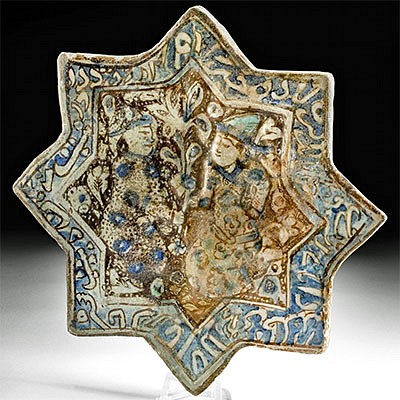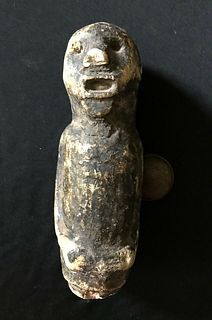20th C. African Wood Ritual Clyster / Enema Funnel
Lot 281
About Seller
Artemis Fine Arts
686 S Taylor Ave, Ste 106
Louisville, CO 80027
United States
Selling antiquities, ancient and ethnographic art online since 1993, Artemis Gallery specializes in Classical Antiquities (Egyptian, Greek, Roman, Near Eastern), Asian, Pre-Columbian, African / Tribal / Oceanographic art. Our extensive inventory includes pottery, stone, metal, wood, glass and textil...Read more
Estimate:
$1,000 - $1,500
Absentee vs Live bid
Two ways to bid:
- Leave a max absentee bid and the platform will bid on your behalf up to your maximum bid during the live auction.
- Bid live during the auction and your bids will be submitted real-time to the auctioneer.
Bid Increments
| Price | Bid Increment |
|---|---|
| $0 | $25 |
| $300 | $50 |
| $1,000 | $100 |
| $2,000 | $250 |
| $5,000 | $500 |
| $10,000 | $1,000 |
| $20,000 | $2,500 |
| $50,000 | $5,000 |
| $100,000 | $10,000 |
| $200,000 | $20,000 |
About Auction
By Artemis Fine Arts
May 20, 2021
Set Reminder
2021-05-20 10:00:00
2021-05-20 10:00:00
America/New_York
Bidsquare
Bidsquare : Ancient & Ethnographic From Around The World
https://www.bidsquare.com/auctions/artemis-gallery/ancient-ethnographic-from-around-the-world-6979
Ancient art from Egypt, Greece, Italy and the Near East, as well as Asian, Fossils, Pre-Columbian, Native American, African / Tribal / Oceanic, Fine art, and much more! All categories, all price ranges... all legally acquired and guaranteed to be as described or your money back. Artemis Fine Arts info@artemisfinearts.com
Ancient art from Egypt, Greece, Italy and the Near East, as well as Asian, Fossils, Pre-Columbian, Native American, African / Tribal / Oceanic, Fine art, and much more! All categories, all price ranges... all legally acquired and guaranteed to be as described or your money back. Artemis Fine Arts info@artemisfinearts.com
- Lot Description
Central Africa, Democratic Republic of the Congo, Hemba, Kuba, or Bangubangu peoples, ca. early to mid-20th century CE. A hand-carved wooden clyster (enema funnel) of a ritual form used on cattle. The conical instrument has a wide funnel mouth that tapers to a narrow tubular opening with a slanted tip for easy administration. The upper funnel shoulder has an integral suspension loop with an abstract anthropomorphic maskette on the exterior bearing ovoid eyes, a trapezoidal nose, and scarification marks across the cheeks and eyebrows. Ritual clysters like this example were thoroughly cleaned and disinfected using fire and smoke which has imbued the funnel with a lustrous brown patina and a slight smoldering scent. Size: 4.7" W x 11.25" H (11.9 cm x 28.6 cm)
Cf. a Kuba example at The University of Michigan Museum of Art, accession number 1984/2.27
Provenance: ex-private St. Petersburg, Florida, USA collection; ex-Dr. Peter Horvath collection, Massachusetts USA, acquired in the 1980s
All items legal to buy/sell under U.S. Statute covering cultural patrimony Code 2600, CHAPTER 14, and are guaranteed to be as described or your money back.
A Certificate of Authenticity will accompany all winning bids.
We ship worldwide and handle all shipping in-house for your convenience.
#158273Small nicks and a few stable hairline fissures to upper funnel rim, with chips to funnel tip, softening to carved face on suspension loop, light encrustations, slight inactive insect damage, and noticeable smoky smell, otherwise intact and very good. Great patina throughout.Condition
- Shipping Info
-
All shipping is handled in-house for your convenience. Your invoice from Artemis Gallery will include shipping calculation instructions. If in doubt, please inquire BEFORE bidding for estimated shipping costs for individual items.
-
- Buyer's Premium



 EUR
EUR CAD
CAD AUD
AUD GBP
GBP MXN
MXN HKD
HKD CNY
CNY MYR
MYR SEK
SEK SGD
SGD CHF
CHF THB
THB

















